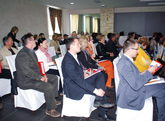 Prijedor, 23 May 2012
Prijedor, 23 May 2012
A screening of the Outreach documentary ‘Sexual Violence and the Triumph of Justice’ provoked a deep emotional response from the more than 80 participants in a public dialogue on wartime crimes of sexual violence held in Prijedor, Bosnia and Herzegovina (BiH), on 23 May.
The screening was the highlight of the one-day conference ‘Models of Victims/Witness Support in War Crimes and Sexual Violence Cases through Enhancing Capacities and Co-operation between Institutions and NGOs’, and it left the audience in a stunned silence as the credits rolled.
A lively discussion then ensued, covering topics such as support to victims during trials, rehabilitation, exercise of the right to restitution, and overall methods of redress for this socially marginalised group. Victims’ representatives asserted that they got no support from either the local or wider communities in their work, and according to one female victim of wartime sexual violence, that lack of support was equal to a repetition of the crimes she and others had suffered.
A representative of the victims’ association Izvor suggested that it was extremely important that events such as those under discussion be recorded in documentary format, saying, “the Tribunal’s documentary on war crimes should be used as a tool in all institutions dedicated to education around the globe, so that such crimes never happen again anywhere.”
The attendees also raised the issue of unequal treatment of victims in the two entities that make up Bosnia and Herzegovina (the Federation and Republika Srpska), in particular pointing out that victims who chose to leave the Federation and return to their homes in Republika Srpska automatically lose their right to disability benefits.
The culture of denial, very strong throughout BiH, and in particular in the Prijedor municipality, was also discussed. Nerma Jelačić, the head of Outreach, told the audience that the facts established before the ICTY, as well admissions of guilt by the accused, were very effective tools for combating denial, and also that there was a lot of work ahead, promoting the Tribunal’s legacy among the local communities, in particular among the young population.
There was a considerable media presence at the conference - including both local and international correspondents – and they had the opportunity to record the lack of support from representatives of the local authorities for the marking of the 20th anniversary of the suffering of the non-Serb population in the Prijedor municipality.

